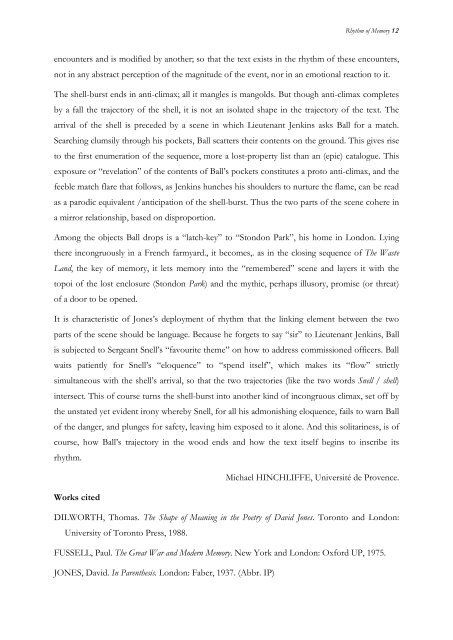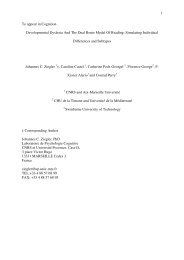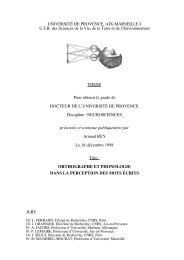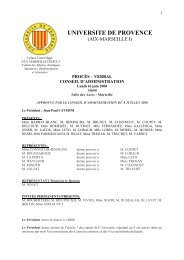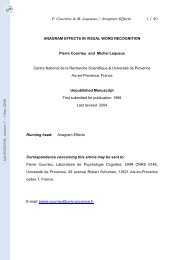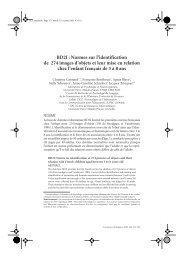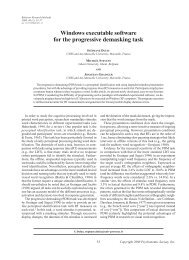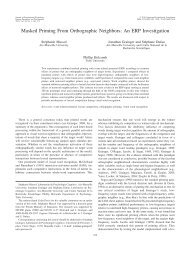The rhythm of memory: a reading of poetic rhythm in David Jones's ...
The rhythm of memory: a reading of poetic rhythm in David Jones's ...
The rhythm of memory: a reading of poetic rhythm in David Jones's ...
- No tags were found...
Create successful ePaper yourself
Turn your PDF publications into a flip-book with our unique Google optimized e-Paper software.
Rhythm <strong>of</strong> Memory 12encounters and is modified by another; so that the text exists <strong>in</strong> the <strong>rhythm</strong> <strong>of</strong> these encounters,not <strong>in</strong> any abstract perception <strong>of</strong> the magnitude <strong>of</strong> the event, nor <strong>in</strong> an emotional reaction to it.<strong>The</strong> shell-burst ends <strong>in</strong> anti-climax; all it mangles is mangolds. But though anti-climax completesby a fall the trajectory <strong>of</strong> the shell, it is not an isolated shape <strong>in</strong> the trajectory <strong>of</strong> the text. <strong>The</strong>arrival <strong>of</strong> the shell is preceded by a scene <strong>in</strong> which Lieutenant Jenk<strong>in</strong>s asks Ball for a match.Search<strong>in</strong>g clumsily through his pockets, Ball scatters their contents on the ground. This gives riseto the first enumeration <strong>of</strong> the sequence, more a lost-property list than an (epic) catalogue. Thisexposure or “revelation” <strong>of</strong> the contents <strong>of</strong> Ball’s pockets constitutes a proto anti-climax, and thefeeble match flare that follows, as Jenk<strong>in</strong>s hunches his shoulders to nurture the flame, can be readas a parodic equivalent /anticipation <strong>of</strong> the shell-burst. Thus the two parts <strong>of</strong> the scene cohere <strong>in</strong>a mirror relationship, based on disproportion.Among the objects Ball drops is a “latch-key” to “Stondon Park”, his home <strong>in</strong> London. Ly<strong>in</strong>gthere <strong>in</strong>congruously <strong>in</strong> a French farmyard., it becomes,. as <strong>in</strong> the clos<strong>in</strong>g sequence <strong>of</strong> <strong>The</strong> WasteLand, the key <strong>of</strong> <strong>memory</strong>, it lets <strong>memory</strong> <strong>in</strong>to the “remembered” scene and layers it with thetopoi <strong>of</strong> the lost enclosure (Stondon Park) and the mythic, perhaps illusory, promise (or threat)<strong>of</strong> a door to be opened.It is characteristic <strong>of</strong> Jones’s deployment <strong>of</strong> <strong>rhythm</strong> that the l<strong>in</strong>k<strong>in</strong>g element between the twoparts <strong>of</strong> the scene should be language. Because he forgets to say “sir” to Lieutenant Jenk<strong>in</strong>s, Ballis subjected to Sergeant Snell’s “favourite theme” on how to address commissioned <strong>of</strong>ficers. Ballwaits patiently for Snell’s “eloquence” to “spend itself”, which makes its “flow” strictlysimultaneous with the shell’s arrival, so that the two trajectories (like the two words Snell / shell)<strong>in</strong>tersect. This <strong>of</strong> course turns the shell-burst <strong>in</strong>to another k<strong>in</strong>d <strong>of</strong> <strong>in</strong>congruous climax, set <strong>of</strong>f bythe unstated yet evident irony whereby Snell, for all his admonish<strong>in</strong>g eloquence, fails to warn Ball<strong>of</strong> the danger, and plunges for safety, leav<strong>in</strong>g him exposed to it alone. And this solitar<strong>in</strong>ess, is <strong>of</strong>course, how Ball’s trajectory <strong>in</strong> the wood ends and how the text itself beg<strong>in</strong>s to <strong>in</strong>scribe its<strong>rhythm</strong>.Michael HINCHLIFFE, Université de Provence.Works citedDILWORTH, Thomas. <strong>The</strong> Shape <strong>of</strong> Mean<strong>in</strong>g <strong>in</strong> the Poetry <strong>of</strong> <strong>David</strong> Jones. Toronto and London:University <strong>of</strong> Toronto Press, 1988.FUSSELL, Paul. <strong>The</strong> Great War and Modern Memory. New York and London: Oxford UP, 1975.JONES, <strong>David</strong>. In Parenthesis. London: Faber, 1937. (Abbr. IP)


